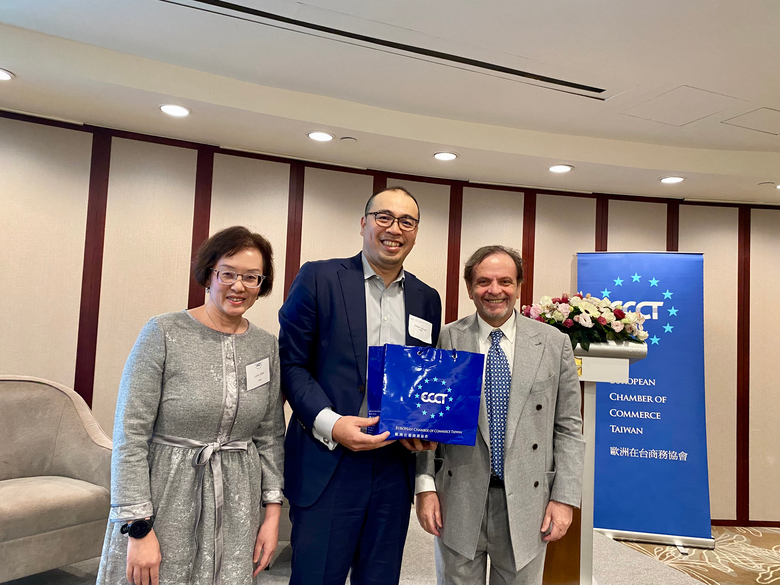Taking advantage of tax incentives

The ECCT’s Tax committee arranged a lunch on the subject of tax incentives in Taiwan, featuring guest speaker Ethan Hsieh, Partner in the Tax investment department of KPMG Taiwan. In his presentation, the speaker gave an overview of various tax incentives available in Taiwan with a special focus on investment credit for smart machinery, 5G networks, and information and communication security, surtax deductions and incentives in Taiwan’s Free Trade Zones (FTZ). He also gave a brief summary of the qualifications, application processes, required documents and timelines to take advantage of the various incentives.
Article 10-1 of Statute for Industrial Innovation (SII) was amended in recent years to provide tax credits for investment in smart machinery, 5G networks, and information and communication security. There are two options: 5% of qualified expenditure creditable against corporate income tax (CIT) payable in the current year (the year in which the purchased items are delivered) or 3% of qualified expenditure creditable against CIT payable in the current year and carried forward for the next two years. The credit is capped at 30% of CIT payable for the current year, which means that corporations will need to calculate which option gives them a higher overall benefit depending on the size of the investment compared to CIT. The minimum amount of investment is NT$1 million while the maximum is NT$1 billion. Applications must be filed online between 1 January and 31 May via an official website of the Industrial Development Bureau (IDB), under the Ministry of Economic Affairs (MOEA), together with an investment plan and supporting documents such as delivery documents, Government Uniform Invoices (GUIs), proof of payment and relevant contracts.
To be eligible for this tax credit, the investment must be regarded as an investment in innovation. The costs of construction work, customs duties, loan interest or subscribing to cloud services do not qualify and are not eligible for the tax credit. However, the cost of integrating new smart technology into existing equipment to make it smart does count. Only Taiwan-registered entities and subsidiaries are eligible for the tax credit, not branches of foreign corporations. The tax credit was originally set to expire at the end of 2023 but it has since been extended to 2024. Companies should therefore take advantage in case it is not extended again.
To encourage investment by companies into their own business operations, Article 23-3 of Statute for Industrial Innovation (SII) was amended in July 2019 to allow qualified capital expenditure to reduce the 5% surtax on undistributed retained earnings. Investments in construction or acquisition of buildings, hardware and software or technologies that are used by companies for their core or ancillary business operation and production qualify but exclude the purchase of land, and acquisition of devices and equipment that would not be capitalised. The investment date should be within three years from the year the earnings are derived. Both the investment date and actual payment date should be within the qualified investment period.
In terms of filing, unlike the tax credit, companies can file surtax returns claiming the surtax deduction, without the need to file investment plans or receive prior approval from the authorities. Expenditure on leasehold improvement (such as renovation costs for an office leased by the company), software upgrade service fees or equipment purchases by a company not for its own use but for that or its subsidiary, do not qualify for this incentive.
Operating in Taiwan’s FTZs also offer tax benefits. Under the Act for the Establishment and Management of FTZ, goods shipped overseas into FTZs by FTZ enterprises for their own operations are exempted from customs duties, VAT, commodity tax, tobacco and alcohol tax, tobacco health and welfare surcharges. Eligible enterprises include enterprises approved to engage in trading, warehousing, logistics, collecting, distributing containers, transiting, transhipment, forwarding, customs clearance, assembling, sorting, packaging, repairing, fabricating, processing, manufacturing, examining, testing, displaying, or technical service within an FTZ. Enterprises which engage only in preliminary or auxiliary business activities in Taiwan by themselves or delegate FTZ enterprises to procure, import, store, or deliver products in FTZs and are approved by the FTZ authorities, are exempted from CIT on the income earned from the sale of such products. However, companies are not eligible for these benefits if the Place of Effective Management (PEM) is in Taiwan, they perform core business activities in Taiwan or they perform partial business activities at a fixed place of business in Taiwan, which exceed the scope of preparatory or auxiliary activities. To apply for tax exemption in FTZs, companies need to apply with the FTZ authorities for a certification letter certifying that the company is only engaging in preparatory or auxiliary activities in Taiwan.
Taiwan also has several laws that provide R&D tax credits for qualified expenditure on innovative R&D activities.
